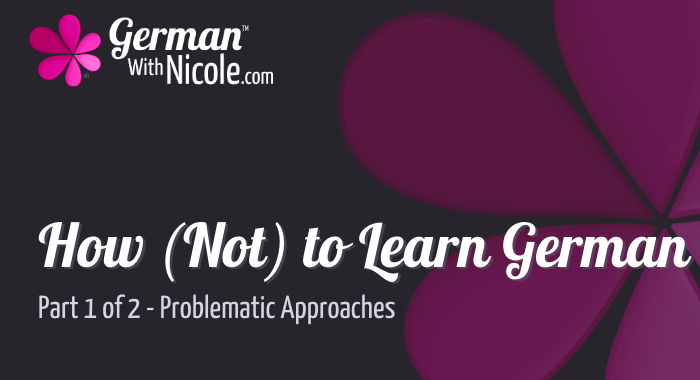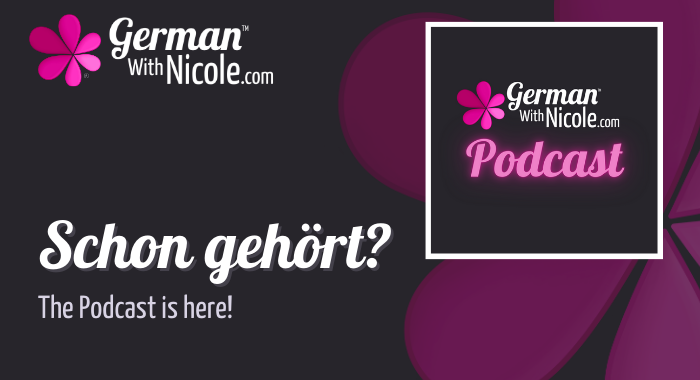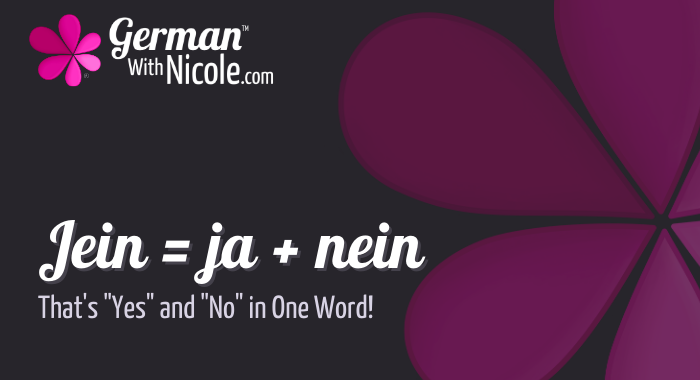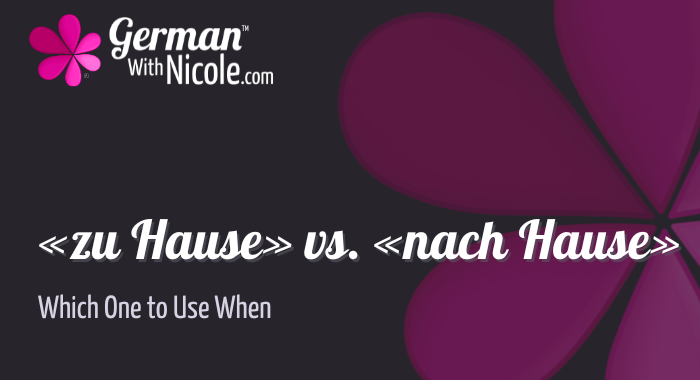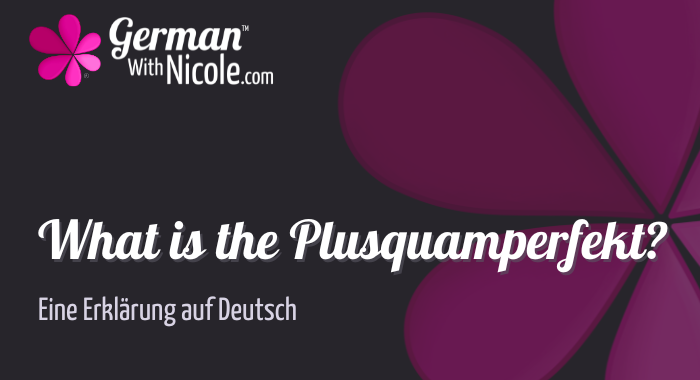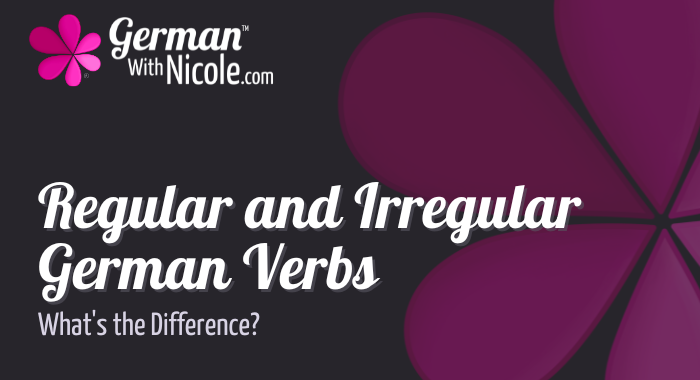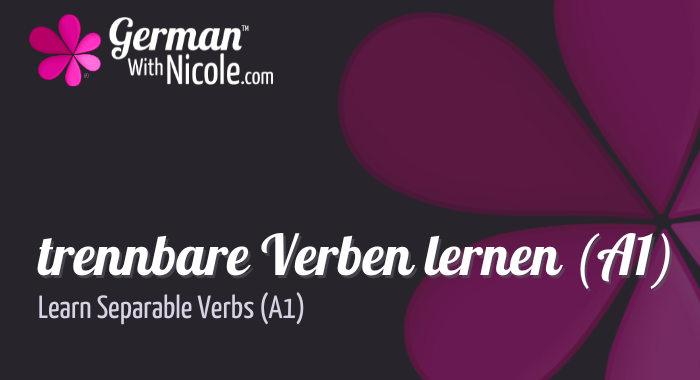das Blog
Deutsch lernen
How (Not) to Learn German Part 1 of 2
Consider your strategy and overall approach to German.
If you have been working on German for a while and are only treading water, this episode will help you figure out which parts of your learning approach are getting in your way.
You'll hear three of the most common, problematic approaches I've seen in the last 11 years of teaching German and 18 years of teaching a foreign language.
This is part 1 of 2 because part 2 will then guide you into more constructive territory for German learning. …
The GermanWithNicole.com Podcast is here!
As usual, the German text is first, then after the flower you'll find the text in English.
Die GermanWithNicole.com Sendung (der Podcast) ist hier! Die Vorschau ist bereit zum Hören und Sie können die Sendung jetzt abonnieren.
Sie können entweder ihre Lieblingspodcastapp öffnen und nach GERMANWITHNICOLE suchen (alles ein Wort), oder Sie können diesen link benutzen:
https://germanwithnicole.captivate.fm/listen
Die Sendung gibt es jetzt überall: Apple Podcasts, Podcast Addict, Spotify, Googl…
Jein = ja + nein
"Jein" is definitely one of the best words in the German language.
It's one word for both yes and no.
ja + nein = jein
Knowing the word "jein" in German opens up a whole new world for German learners and their eyes get really big and their ears perk the first time they hear the word.
"Jein" also has several uses; for starters, "jein" allows you to give two simultaneous answers to one question: ja und nein - yes and no.
This is perfect for difficult answers.
When it's impossible to give a s…
"zu Hause" vs. "nach Hause"
The difference between "zu Hause" vs. "nach Hause" easily trips up German learners, but it doesn't have to trip you up if you use the tips below.
1. "zu Hause" = (at) home
"zu" is usually used as a preposition, so it would stand by itself and you might think that "zu Hause" means "to home."
This is an exception.
When you say "zu Hause," you're really using it as one block of language.
Think of the sentence "Ich bin zu Hause" and picture it like three wooden blocks:
[Ich] [bin] [zu Ha…
5 Top Tips to Help You Speak German More Easily
Erfolg hat drei Buchstaben: t u n ![1]
~Johann Wolfgang von Goethe
Success has two letters: do!
To be successful at speaking German, you need to speak, and trying to speak without any form or specific goal makes it more difficult. It’s important to give yourself a specific task or framework for speaking.
Most people simply try to talk about everything all the time. That won't help you. Why? Because you know a TON of English/whatever your native language is, however in a foreign language …
German Spring Cleaning Products (Nicole's 3 Favorites)
Germanize your Spring Cleaning!
Es ist an die Zeit für den Frühlingsputz!
It's time for Spring cleaning!
A thorough Spring clean is much nicer when your cleaning products are high quality, biodegradable, and even smell nice!
This week you'll find out what my three favorite German cleaning products are.
Next week you'll be able to download a new, 4x6 card with Spring Cleaning vocabulary on it.
Because what better way is there to make your Spring Clean more enjoyable than to do it auf Deutsc…
11 German Words for Holy Week and Easter (Karwoche und Ostern)
Christian Holidays are often public holidays in Germany, so these are good words to know whether you're non-religious, atheist, agnostic, or religious.
The schedule carries over into school and school breaks, too. One of my clients is currently on Osterferien, Easter Holidays, and doesn't have school this week or next.
This week is Karwoche, or Holy Week, and in a non-pandemic year there would be much singing of the Bach Passions: the Matthäus-Passion (St. Matthew Passion), the Johannes-Passio…
What is the Plusquamperfekt?
The Plusquamperfekt is a form of the past tense in German.
It's generally reserved for high intermediate and advanced learners at levels B2 and C1.
If you're not there yet, I recommend you save this blog post for later.
The remainder of this blog post is in German, as is the explanation video.
![]()
Das Plusquamperfekt ist sehr hilfreich, wenn Sie über zwei verschiedene Ereignisse reden wollen, und beide bereits passiert sind.
Es kann viel Spaß machen, wenn Sie das Plusquamperfekt bilden und au…
Regular and Irregular German Verbs: What's the Difference?
Almost all of the people who sign up for private German lessons have already run into German verbs and their conjugations.
When we get to the Perfekt (the present perfect or spoken past tense), it's always interesting to hear what they think of it so far.
Here are a few of the top questions people have asked me about learning the Perfekt:
-
Are these regular or irregular verbs?
-
What's the difference between them?
-
What's the pattern for these verbs? And for these verbs? And f…
Lernen Sie trennbare Verben ~ Learn German Separable Verbs
Today you get to learn separable verbs (trennbare Verben) just like one of my German clients!
This is a technique I've used with dozens of German learners and it makes separable verbs a kinaesthetic exercise--and that in two different ways.
You'll need print out or write out some cards, and to have one supply to have ready when you start the video.
Los geht's!
Step 1: Print out or make these cards of trennbare Verben
Download this PDF of 4x6 cards and print them.
If you can't print them, …
Categories
- A1 (69)
- A2 (54)
- B1 (46)
- B2 (23)
- C1 (22)
- Deutsch lernen (78)
- Einkaufen (15)
- Essen (12)
- Grammatik (23)
- Hören (14)
- Landeskunde und Kultur (49)
- Lesen (11)
- Musik (5)
- Nachrichten (4)
- Podcast (61)
- Pronunciation (3)
- Schreiben (3)
- Schwäbisch (4)
- Spiele und Spaß (Games and Fun) (12)
- Sprechen (13)
- Vokabeln (39)
- Video (11)
